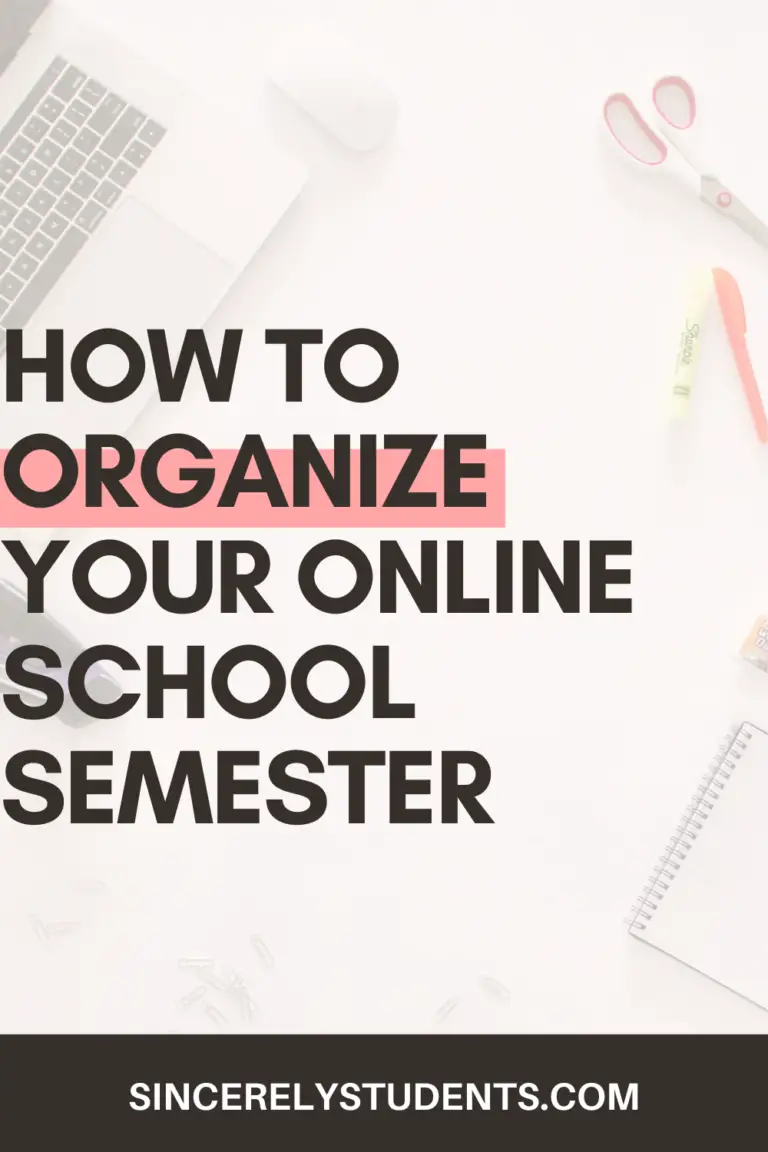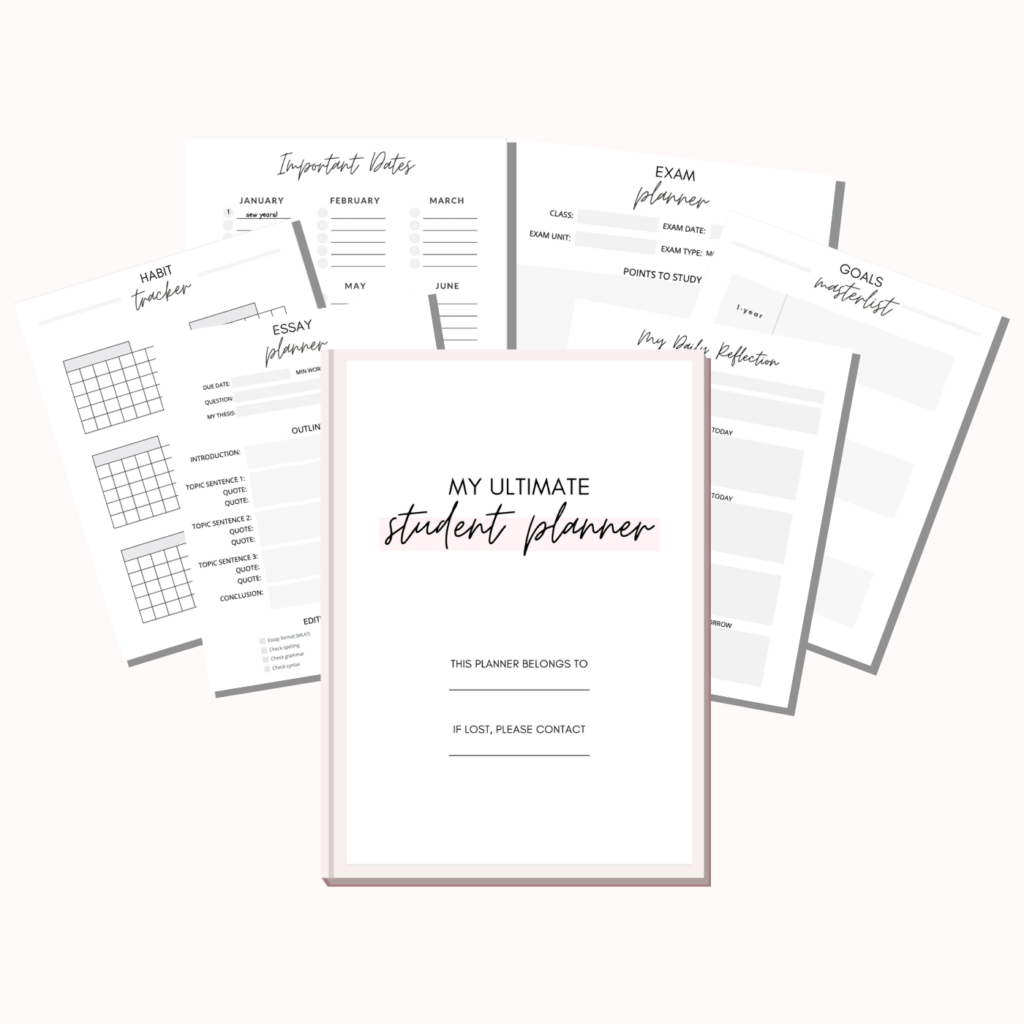It’s that time of the year once more! That’s right, it’s back-to-school season.
Staying organized is one of the most important ways to be productive and successful in school, and that’s no different when it comes to online classes!
Online school is pretty new to all of us, and we have to face different challenges because of it. But there’s one thing I know for sure: students must learn to execute self-control and be productive without teachers monitoring them.
Does that sound hard? If so, you’re in the right place!
Planning out your entire school semester is easier than it sounds. In this post, I’m going to share my top tips for organizing an entire school semester to stay on top on your game (and your grades).

But first…
Why is getting organized so important?
Well, here are a few reasons:
- Helps you become more productive
- Reduces stress and anxiety over the “unknown”
- Saves you time and space
And all of these combined can set you up for a great school year. Alright, let’s get into the good stuff now.
Must-Have Supplies
Although I wish I could organize everything inside my head, I can’t. Most of the time, I rely on some tools to help me stay on top of my organizing game. Let me show you some of the most essential supplies you need this semester.

- Planner: If you’ve been reading my posts for a while, you know how much I emphasize planners. They can literally hold everything, and in an organized fashion! So make sure you have a quality one handy (one like this planner, where you can plan, schedule, prioritize, and more clearly and easily).
- Highlighters: Color-coding isn’t just for aesthetics. Color-coding can increase organization significantly by helping you easily differentiate between different types of tasks or classes. For example (and this is just my preferences), I use red for math, green for sciences, purple for social studies, etc.
- Calendar: I have a calendar hanging near my desk, and it’s extremely helpful for when I’m occupied on my computer. I can just look up really quickly and scan my calendar, and I’ll know when the next important date is.
- Sticky notes: I use these to jot down quick notes to stick on my wall (yup, my wall’s pretty full). For example, I recently copied down the entire “bell schedule” for online classes and stuck it somewhere I can easily see. You can also use them to write daily to-do lists or small reminders.
- Scratch paper: Perfect (and crucial) for math problems! Whenever you’re doing a complicated math question, just grab a piece of paper from the side and get working! If you’d like to be a little neater and a tad bit more extra, you can opt for a notebook instead.
- Pen organizer: If you’re an on-the-side pen collector like me, you have about 14 pens from Muji, 9 highlighters from Mildliners, and a bunch of random pencils and Sharpies. To organize them, I use these upright pen storage organizers; they save me so much space on my desk! I was able to fit all 40-something pens into 1 organizer, and it only takes up about the volume of plastic water bottle.
Set Up Your Planner
Now that you have a planner, we need to set it up properly to ensure success in your organizing game. Here’s all you need to do to start:
- Decide on a color-coding system. This is a key step in organizing, but how you pick the colors is completely personal preference.
- Write down the contacts of people in your classes. This way, you can easily reach out to others when you’re in need to help.
- Write down important dates. I will go into detail about this very soon!
- Set goals for the school year – both big and small.
It’s super important to use a quality planner from the very start! Some people are fans of the big planners with a lot of motivational quotes and extra pages, but I believe that simple planners are better for students looking to organize.
Related Post: 8 Daily Habits To Build To Become A Top Student
Take Note Of Important Dates
It’s pretty difficult to remember all the test dates your professor tells you at the beginning of the school year then never mentions again. To make sure you don’t miss any, you must write them down.
You can do this in multiple places, for example: a desk calendar, a digital calendar, and a planner. By using a desk calendar to mark important dates, you can reference them easily at a glance. However, it’s difficult to change them if something comes up (especially if you wrote it in colored pens).
By using a digital calendar, you can set automatic reminders for yourself before the event comes along. Depending on what app you use, you can also get nitty-gritty with your planning and use time-blocking to schedule that event.
With a planner, you can easily add all the extra detailed information you need to each event. For example: class, time, class unit, Zoom code, main knowledge points, and more. However, same as a physical calendar, you might have difficulties making changes.
Bookmark Websites
This has always been important in school, but it’s even more important now that classes have moved online. There’s literally a bunch of websites teachers use nowadays, and it’s important to bookmark them to save time and energy.
If you don’t know how to bookmark a website, it’s really simple. Simply find the outlined star in the top corner of your browser and click it. You’ll be able to choose a name for that bookmark and save it to your Bookmarks Bar, or a folder. I suggest making folders for each class, and maybe putting all those class folders in a School folder.
Here are a couple websites I suggest every student bookmark:
- Your school website (for important announcements/news)
- Your school email
- Google Classroom for each class
- Your teachers’ websites if they’re relevant/helpful
- Homework assignments you’re working on
- Google Drive, Docs, Slides, and Sheets
Organize Your Desk
For the next 10 months, your desk is going to be your campus. How exciting!
In order to be productive at home, your desk needs to be set up for it. This means that there are a couple things you should have at/around your desk, and there are some things you should not have anywhere near your desk.
Here are some things you should have:
- Your pens, pencils, and highlighters
- Your laptop
- A good desk lamp
- Blue-light blocking glasses
- Some scratch paper/notebooks
- School textbooks
- Ather miscellaneous items like tissues, water, headphones…
Here are some things you should not have:
- Your phone (I know, I know)
- Video games
- Food (some snacks like nuts and popcorn are okay)
If you have 2 desks in your room, you can set one up for school and work, and the other for fun and leisure time. By clearly differentiating between the two and making a habit of only being productive at your “school” desk, your body will automatically get into work mode when you sit at that desk. Of course, this is only if you have 2 desks, which is totally optional and not necessary at all.
Create Routines
Routines are super important for establishing habits, which then help you become more productive and organized. And by routines, I don’t just mean your skincare routine (although that’s important, too!).
You should have a refreshing morning routine that gets you ready for the day. This means a good breakfast, some stretching, and maybe a shower.
You should have a relaxing evening routine that helps you loosen the muscles you’ve been using all day– or the lack thereof– and get prepared for the next day.
Most importantly, you should have a productive study routine during the day.
Your school may or may not have bell schedules for online classes. If they do, follow that (it should be required, anyways)! If they don’t, try to reference the one from last year!
Whenever you’re studying, make sure to take breaks in between. Many students and adults alike use the Pomodoro method, where you focus for 25 minutes straight, then rest for 5 minutes.
It’s important to remember that a break means physical and mental relaxation, so make sure to take a small walk before you sit back down. Also, save the social media or TV for when you finish all your tasks. Treat those as a reward rather than a break.
Set Goals
Last but not least, you should create goals– short and long-term ones. Setting goals is great for motivation, and helps you break down big tasks you might find difficult to tackle.
Every day, set some goals for yourself. You can set simple ones, such as finishing a math assignment or attending all your Zooms for the day. You can also set habitual, recurring goals, such as drinking enough water and finishing all your homework before 8 pm.
You can (and should) also set goals for the week, month, and year. These long-term goals should be difficult, but not impossible to reach. Break them down into smaller milestones so you’re less intimidated by it! For example, if you started the school year with a C+ in AP Literature, set goals each month to raise that grade a little until you get your desired grade.
Remember to reward yourself for reaching your goals! It can be as small as getting some takeout from your favorite restaurant, or as big as getting yourself a new phone. Of course, these rewards should reflect the efforts you put in.
Conclusion
Let me make something clear: there’s no right or wrong way to organize. If you thrive from the lack of organization, then so be it! If you find yourself most productive at the kitchen table while eating a taco, that’s great!
It all depends on your habits and preferences. Just do whatever you do best, and I’m sure you’ll crush it this semester!
If you’re looking for more posts about online school, check out these related posts.